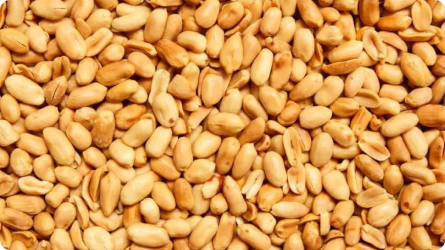Premium Peanuts
Peanuts and ESG
Brazilian peanuts in
over 40 countries
Coplana produces and trades in highly selected peanuts, with two processing units in Jaboticabal/SP. The “Coplana Brazilian Premium Peanuts” brand is a reference in the food industry in Brazil and abroad. It exports to over 40 countries on five continents, selling to demanding markets such as those in the European Union. The focus is always to increase in quality, expanding the service to the greater global industry.
Annually, Coplana receives around 100,000mt of peanuts inshell, after shelling process, 60.000mt are edibles. About 50% is exported.
Peanuts and market transformation
Coplana has 110 cooperative peanut farmers, who work with dozens of other families and grow the crop in sugarcane renewal areas under the crop rotation system. The model has been encouraged by the Cooperative since the early 1980s. Thus, the same areas that produce sugar and the renewable fuel ethanol produce premium peanuts.
This was a pioneering work, which brought back the crop based on family traditions in the region. At the start of these cooperative members’ trajectory, peanuts brought ESG concepts to the field and to processing at the Cooperative (within environmental, social and governance criteria), as the crop enabled small sugarcane producers to expand and become major peanut producers.
The crop provided work and income for families and generated jobs throughout the region. Technical benefits became part of the cane-peanut partnership, with agronomic advantages for both crops, in addition to gains in terms of production sustainability.
The main characteristics of peanut growth among cooperative producers were the stimulus to mechanization in the field, the use of new varietals, technological investments in the reception and processing structure, the quest for quality, sustainability and articulation with new markets.
Recently, Coplana started its expansion project focused on origination, i.e. harvest areas, prospecting new regions, aiming to ensure its sustainable growth and to provide increasingly more value for the cooperative members.

Exports
In 2000, the Cooperative began to trade internationally. Investments in good manufacturing practices and technological advances, both in the field and post-harvest, were key to winning its first certification. Starting in 2010, Coplana received several international certifications, such as BRCGS, Kosher, Sedex, Pró-Amendoim and Halal.
Peanut Capital
In 2018, acknowledging the efforts and pioneering spirit of cooperative members and the cooperative itself for the evolution of the crop and the development of the region’s economy, the State Government of São Paulo awarded the title of “Peanut Capital” in the State to the city of Jaboticabal, through of Law No. 16,640 (of January 5, 2018).
